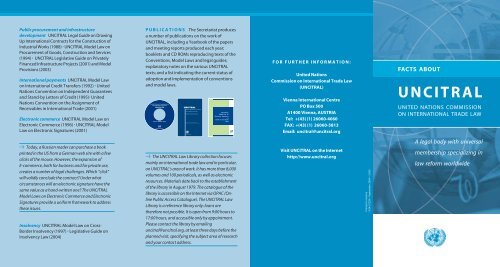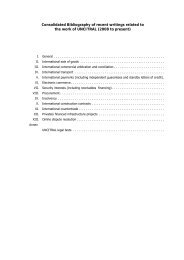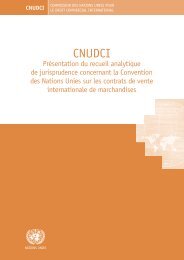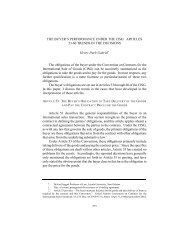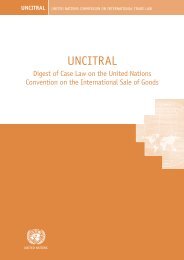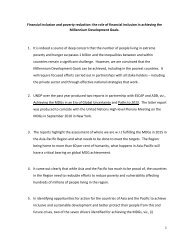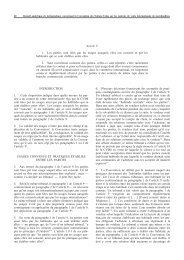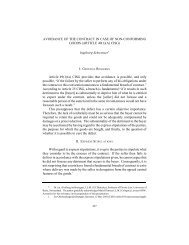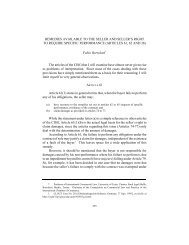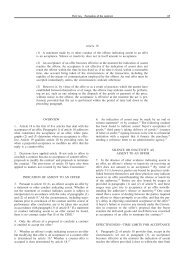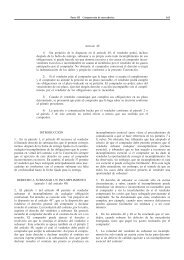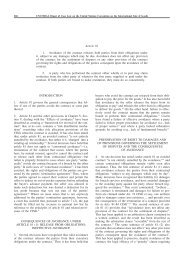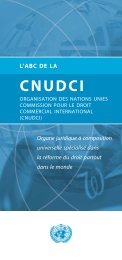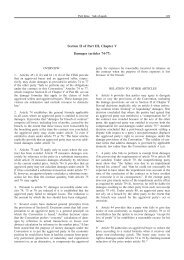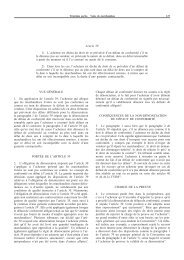Facts about UNCITRAL leaflet
Facts about UNCITRAL leaflet
Facts about UNCITRAL leaflet
Create successful ePaper yourself
Turn your PDF publications into a flip-book with our unique Google optimized e-Paper software.
Prepared by the United Nations<br />
Commission on International Trade Law<br />
UNITED NATIONS<br />
UNITED NATIONS<br />
Public procurement and infrastructure<br />
development <strong>UNCITRAL</strong> Legal Guide on Drawing<br />
Up International Contracts for the Construction of<br />
Industrial Works (1988) • <strong>UNCITRAL</strong> Model Law on<br />
Procurement of Goods, Construction and Services<br />
(1994) • <strong>UNCITRAL</strong> Legislative Guide on Privately<br />
Financed Infrastructure Projects (2001) and Model<br />
Provisions (2003)<br />
International payments <strong>UNCITRAL</strong> Model Law<br />
on International Credit Transfers (1992) • United<br />
Nations Convention on Independent Guarantees<br />
and Stand-by Letters of Credit (1995)• United<br />
Nations Convention on the Assignment of<br />
Receivables in International Trade (2001)<br />
Electronic commerce <strong>UNCITRAL</strong> Model Law on<br />
Electronic Commerce (1996) • <strong>UNCITRAL</strong> Model<br />
Law on Electronic Signatures (2001)<br />
PUBLICATIONS The Secretariat produces<br />
a number of publications on the work of<br />
<strong>UNCITRAL</strong>, including a Yearbook of the papers<br />
and meeting reports produced each year;<br />
booklets and CD ROMs reproducing texts of the<br />
Conventions, Model Laws and legal guides;<br />
explanatory notes on the various <strong>UNCITRAL</strong><br />
texts; and a list indicating the current status of<br />
adoption and implementation of conventions<br />
and model laws.<br />
United Nations Commission on<br />
International Trade Law<br />
YEARBOOK<br />
Volume XXXIII: 2002<br />
United Nations<br />
<strong>UNCITRAL</strong><br />
Model Legislative Provisions<br />
on Privately Financed<br />
Infrastructure Projects<br />
<strong>UNCITRAL</strong><br />
Model Law on<br />
Electronic Signatures<br />
with<br />
Guide to Enactment<br />
2001<br />
FOR FURTHER INFORMATION:<br />
United Nations<br />
Commission on International Trade Law<br />
(<strong>UNCITRAL</strong>)<br />
Vienna International Centre<br />
PO Box 500<br />
A1400 Vienna, AUSTRIA<br />
Tel: +(43) (1) 26060-4060<br />
FAX: +(43) (1) 26060-5813<br />
Email: uncitral@uncitral.org<br />
FACTS ABOUT<br />
<strong>UNCITRAL</strong><br />
UNITED NATIONS COMMISSION<br />
ON INTERNATIONAL TRADE LAW<br />
t Today, a Russian reader can purchase a book<br />
printed in the US from a German web site with a few<br />
clicks of the mouse. However, the expansion of<br />
E-commerce, both for business and for private use,<br />
creates a number of legal challenges. Which “click”<br />
will validly conclude the contract? Under what<br />
circumstances will an electronic signature have the<br />
same value as a hand-written one? The <strong>UNCITRAL</strong><br />
Model Laws on Electronic Commerce and Electronic<br />
Signatures provide a uniform framework to address<br />
these issues.<br />
Insolvency <strong>UNCITRAL</strong> Model Law on Cross-<br />
Border Insolvency (1997) • Legislative Guide on<br />
Insolvency Law (2004)<br />
t The <strong>UNCITRAL</strong> Law Library collection focuses<br />
mainly on international trade law and in particular,<br />
on <strong>UNCITRAL</strong>'s area of work. It has more than 8,000<br />
volumes and 100 periodicals, as well as electronic<br />
resources. Materials date back to the establishment<br />
of the library in August 1979. The catalogue of the<br />
library is accessible on the Internet via OPAC (Online<br />
Public Access Catalogue). The <strong>UNCITRAL</strong> Law<br />
Library is a reference library only: loans are<br />
therefore not possible. It is open from 9:00 hours to<br />
17:00 hours, and accessible only by appointment.<br />
Please contact the library by emailing<br />
uncitral@uncitral.org, at least three days before the<br />
planned visit, specifying the subject area of research<br />
and your contact address.<br />
Visit <strong>UNCITRAL</strong> on the Internet<br />
http://www.uncitral.org<br />
Printed in Austria<br />
V.04-57239—September 2004—2,000<br />
A legal body with universal<br />
membership specializing in<br />
law reform worldwide
It is widely accepted that trade creates wealth and<br />
is essential to the economic health of the world.<br />
But who works out the rules for international<br />
trade and decides how payments should be made<br />
and disputes are to be settled?<br />
When world trade began to expand<br />
dramatically in the 1960s, national<br />
governments began to realize the need for a<br />
global set of standards and rules to harmonize<br />
and modernize the assortment of national and<br />
regional regulations, which until then largely<br />
governed international trade. They turned to<br />
the United Nations, which in 1966 recognized<br />
the need for it to play a more active role in<br />
removing legal obstacles to the flow of<br />
international trade and established the<br />
United Nations Commission on International<br />
Trade Law (<strong>UNCITRAL</strong>). <strong>UNCITRAL</strong> has since<br />
become the core legal body of the United<br />
Nations system in the field of international<br />
trade law.<br />
Much of the complex network of international<br />
legal rules and agreements that affects today's<br />
commercial arrangements has been reached<br />
through long and detailed consultations and<br />
negotiations organized by <strong>UNCITRAL</strong>. Its aim is<br />
to remove or reduce legal obstacles to the flow<br />
of international trade and progressively<br />
modernize and harmonize trade laws. It also<br />
seeks to coordinate the work of organizations<br />
active in this type of work and promote wider<br />
acceptance and use of the rules and legal texts<br />
it develops.<br />
MEMBERSHIP The Commission<br />
comprises 60 member States elected by the<br />
United Nations General Assembly for a term<br />
of six years. Membership is structured to<br />
ensure representation of the world's various<br />
geographic regions and its principal economic<br />
and legal systems.<br />
WORK METHODS Texts designed<br />
to simplify trade transactions and reduce<br />
associated costs are developed by working<br />
groups comprising all member States of<br />
<strong>UNCITRAL</strong>, which meet once or twice per year.<br />
Non-member States and interested international<br />
and regional organizations are also<br />
invited and can actively contribute to the work<br />
since decisions are taken by consensus, not by<br />
vote. Draft texts completed by these working<br />
groups are submitted to <strong>UNCITRAL</strong> for<br />
finalization and adoption at its annual session.<br />
SECRETARIAT The International Trade<br />
Law Division of the United Nations Office of<br />
Legal Affairs provides substantive secretariat<br />
services to <strong>UNCITRAL</strong>, such as conducting<br />
research and preparing studies and drafts.<br />
TRADE LAW TEXTS <strong>UNCITRAL</strong> develops<br />
different types of texts to modernize and<br />
harmonize the law of international trade. These<br />
texts are generally legislative in nature, such as<br />
conventions, model laws and legislative guides,<br />
or non-legislative texts such as contractual rules<br />
that can be incorporated into commercial<br />
contracts and legal guides.<br />
Convention: an agreement among States<br />
establishing obligations binding upon those<br />
States that ratify or accede to it.<br />
Model law: a set of model legislative provisions<br />
that States can adopt by enacting it into<br />
national law.<br />
Legislative guide: a text that provides guidance<br />
for the development of laws, discussing relevant<br />
policy issues and choices and recommending<br />
appropriate legislative solutions.<br />
Contractual rules: standard clauses or rules<br />
designed to be included in commercial contracts.<br />
Legal guide: a text that provides guidance for<br />
the drafting of contracts, discussing relevant<br />
issues and recommending solutions appropriate<br />
to particular circumstances.<br />
TECHNICAL LEGISLATIVE<br />
ASSISTANCE One of <strong>UNCITRAL</strong>'s priorities<br />
is providing technical legislative assistance for<br />
modernization of trade laws and commercial<br />
practices. In addition to promoting understanding<br />
of international trade law texts and<br />
the benefits they can bring to the expansion<br />
of international trade, <strong>UNCITRAL</strong> assists States<br />
to develop the laws required to implement<br />
these legislative texts and commercial<br />
associations to promote the use of<br />
non-legislative rules.<br />
CLOUT The Case Law on <strong>UNCITRAL</strong> Texts<br />
system is a collection of court decisions and<br />
arbitral awards interpreting <strong>UNCITRAL</strong> texts.<br />
Currently, CLOUT includes case abstracts in the<br />
six United Nations languages on the United<br />
Nations Convention on Contracts for the<br />
International Sale of Goods (CISG) (Vienna, 1980)<br />
and the <strong>UNCITRAL</strong> Model Law on International<br />
Commercial Arbitration (1985). Other texts will<br />
be added as case law becomes available.<br />
ACHIEVEMENTS Over the last 24 years,<br />
<strong>UNCITRAL</strong> has completed major international<br />
texts on the sale of goods, transport, dispute<br />
resolution, procurement and infrastructure<br />
development, international payments, electronic<br />
commerce and insolvency. International<br />
arbitration, transport law, electronic commerce,<br />
insolvency law, security interests and public<br />
procurement are the focus of current work.<br />
Sale of goods United Nations Convention on<br />
Contracts for the International Sale of Goods<br />
(Vienna, 1980) • <strong>UNCITRAL</strong> Legal Guide on<br />
International Countertrade Transactions (1992)<br />
Transport of goods United Nations Convention<br />
on the Carriage of Goods by Sea (Hamburg, 1978)<br />
t More than 90 per cent of the world trade is carried<br />
by ship. Many of the exotic goods and commodities<br />
surrounding us reach us in this way. Many of them<br />
actually change hands several times during their<br />
voyage at sea. What happens in the case of loss of<br />
cargo? What if it is difficult or impossible to ascertain<br />
the moment when the loss occurred? <strong>UNCITRAL</strong>'s work<br />
in the field of maritime law provides States with a<br />
common legal framework, establishing clear rules that<br />
contribute to reducing transport costs for the benefit<br />
of us, the final consumers.<br />
Dispute resolution <strong>UNCITRAL</strong> Arbitration Rules<br />
(1976) • <strong>UNCITRAL</strong> Conciliation Rules (1980) •<br />
Recommendations to assist arbitral tribunals<br />
and other interested bodies with regard to<br />
arbitrations under the <strong>UNCITRAL</strong> Arbitration<br />
Rules (1982) • <strong>UNCITRAL</strong> Model Law on<br />
International Commercial Arbitration (1985)<br />
<strong>UNCITRAL</strong> Notes on Organizing Arbitral<br />
Proceedings (1996) • <strong>UNCITRAL</strong> Model Law on<br />
International Commercial Conciliation (2002)


